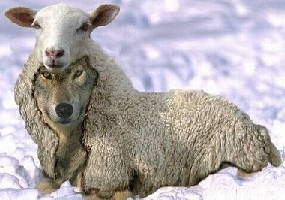"Prophet" Muhammad?
Muhammad: True or False Prophet?
"Prophet" Muhammad
Which prophet was Muhammad?
 Christians
claim Muhammad was a false prophet, while Muslims of course claim Muhammad was a
true
prophet. To see whether Muhammad was a true or false prophet, let's start with the passage in
the Bible in which God, according to Muslims, foretells Moses about Muhammad:
Christians
claim Muhammad was a false prophet, while Muslims of course claim Muhammad was a
true
prophet. To see whether Muhammad was a true or false prophet, let's start with the passage in
the Bible in which God, according to Muslims, foretells Moses about Muhammad:
"I will raise up for them a Prophet like you from among their brethren, and will put My words in His mouth, and He shall speak to them all that I command Him. And it shall be that whoever will not hear My words, which He speaks in My name, I will require it of him." (Deuteronomy 18:18-19)
Is Muhammad the prophet that God promised in this passage?
The verses that immediate follow the above verses read:
"But the prophet who presumes to speak a word in My name, which I have not commanded him to speak, or who speaks in the name of other gods, that prophet shall die.’ And if you say in your heart, ‘How shall we know the word which the Lord has not spoken?’ - when a prophet speaks in the name of the Lord, if the thing does not happen or come to pass, that is the thing which the Lord has not spoken; the prophet has spoken it presumptuously; you shall not be afraid of him." (Deuteronomy 18:20-22)
A prophet of God is the mouthpiece of God, who is perfect and never wrong. Therefore, when someone claims to be speaking as instructed by God and then makes a false statement, that person "has spoken presumptuously" and is not God's prophet.
Did Muhammad make any such false statement?
When Muhammad conquered the pagan Mecca, it worshipped three hundred and sixty idols. The four most important among them were the moon god, "Sin," also known as "Hubal," also known as "Allah," and his three daughters: Al-Lat, Al-Uzza and Al-Manat.
Muhammad's attempt to impose monotheism by keeping just Allah and getting rid of the other three hundred and fifty-nine Meccan idols faced resistance from the Meccans, who held Allah's three daughter idols very dear.
Eager to be accepted as a prophet in his native Mecca, Muhammad initially conceded that Allah approved of Al-Lat, Al-Uzza and Al-Manat. But unable to reconcile three extra goddesses with his declared monotheism, Muhammad later reversed himself, confessing, "I have fabricated things against Allah and have imputed to him words which he has not spoken." (Al Tabari, The History of Al-Tabari, vol. 6, p.111) and said he had mistaken the words of "Satan" (Ibn Ishaq, Sirat Rasul Allah, pp.165-166) as Allah's.
Given Allah's true identity, the words of Allah and Satan would not be hard to confuse. Had Muhammad claimed to be a prophet of the God of the Bible, however, someone who hears from Satan, mistakes Satan's words as God's and fabricates "things against" God is a false prophet whom God said above, "shall die."